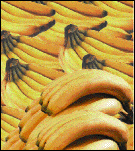
BRUSSELS, Belgium (AP):
THE EUROPEAN Commis-sion launched a new initiative yesterday to resolve a bruising international trade dispute over bananas by October and end U.S. sanctions imposed in retaliation for the EU's banana import regime.
"New impetus must be given to negotiations," said EU Agricul-ture Commissioner Franz Fischler. "We have set ourselves a deadline and we want to conclude as early as possible."
The European Union is seeking a solution which will allow it to protect its own banana producers and traditional suppliers in Africa and the Caribbean, while complying with a 1997 World Trade Organisation (WTO) ruling that it unfairly discriminates against Latin American bananas marketed by U.S. companies.
Last year, the WTO authorised the United States to imposes sanctions on EU products worth US$191 million a year as the EU failed to modify its import practices in line with the ruling. Ecuador has also been authorised to impose sanctions.
Fischler acknowledged the EU would have to abandon its plan to maintain quotas on banana imports based on "historical" suppliers.
Instead, he said the Commis-sion would seek a mandate from EU governments to negotiate a system that would allow exporters to apply for licences to sell a low-tariff quota of bananas to the Union on a "first come, first served" basis.
The EU executive body hopes that mandate will be approved Monday at a meeting of foreign ministers from the 15 EU nations, but EU Trade Commis-sioner Pascal Lamy said support from the governments was not certain.
Spain, France and Portugal, which produce their own bananas in island territories, and Britain, which want to protect producers in former colonies, have been most determined to maintain a system of preferences that limits imports of so-called "dollar bananas" from Latin America.
Lamy acknowledged that even if the Commission received government backing, it still faced an uphill task persuading the United States to go along. Washington wants the EU to end all banana quotas.
The EU has long argued that its quota system is needed to protect smaller Caribbean and African nations whose econo-mies are largely dependent on banana exports.





















































